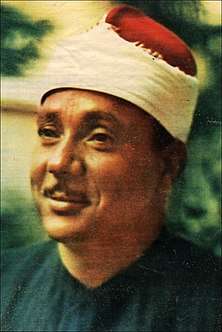Abdul Basit 'Abd us-Samad
‘Abdul-Basit ‘Abdel-Samad (Arabic: عبـدُ الباسِـط مُحـمّـد عبـدُ ٱلصّـمـد), or Abd ul-Basit Abd us-Samad, or Abdul Basit Muhammad Abdus Samad (1927 – 30 November 1988) was an Egyptian Quran reciter[2] and is regarded as one of the best reciters of the Quran of his time.[1][3][4][5] He had won three world Qira'at competitions in the early 1970s. ‘Abdus-Samad was one of the first huffaz to make commercial recordings of his recitations, and the first president of the Reciters' Union in Egypt. At 10, Abdul Basit finished learning the entire Quran by heart in his village. He also learned 7 styles of Quran recitation by the age of 12 and the 10 styles by 14. The quadrumvirate of El Minshawy, Abdul Basit, Mustafa Ismail, and Al-Hussary are generally considered the most important and famous Qurra' of modern times to have had an outsized impact on the Islamic world.[6][7][8][9]:83. He gained the reputation of being called the Golden Throat and the Voice of Heaven due to his melodious style, remarkable breath control, and unique emotional and engaging tone. His legacy remains unmatched as Qur'an reciters attempt to imitate his unique style.
Shaykh al Maqâri Abdul Baset Muhammad Abdus Samad | |
|---|---|
عبـدُ الباسِـط مُحـمّـد عبـدُ ٱلصّـمـد | |
 | |
| Title |
|
| Personal | |
| Born | 1927 Armant, Hermonthis, Upper Egypt |
| Died | 1988 (aged 60–61) |
| Nationality | Egyptian |
| Known for | His unique melodic recitation of the Quran |
| Occupation | |
| Senior posting | |
| Website | |
Travels
Abdul Basit travelled extensively inside and outside Egypt. He recited at the Sacred Mosque, the Haram Mosque of Mecca several times. In 1961, he also recited at the Badshahi Masjid, in Lahore, Pakistan as well as reciting in one of the biggest Madrasash's.
Illness and death
He died of an illness due to an accident. Most sources claim he died in a car crash, which has been disproved. Seven days before his death, 'Abdus-Samad was admitted to one of the best hospitals in London. The burial attracted thousands of people and was attended by officials from Islamic countries.[10] The exact date of his death has been confirmed to be on 30 November 1988, and his surviving relatives included (from oldest to the youngest): Yasir, Hisham, and Tariq. Following his father's footsteps, Yasir also became a Qari. In 2006, a mosque in his native village of Armant in Luxor, Southern Egypt, was opened under his name.[11]
References
- https://www.youtube.com/watch?v=MhrNn1tNCNg&t=739s
- لقاء مع طارق عبد الباسط نجل القارئ عبد الباسط عبد الصمد,
ملك المغرب محمد الخامس عرض عليه الإقامة الكاملة والجنسية المغربية، فرفض وقال أنا رجل صعيدى واعتز بمصريتى.
- Egyptian Quran reciter, Abdul Bad it Abdel Samad - القارئ المصري الشيخ عبد الباسط عبد الصمد, retrieved 2019-11-08
- صفحة القارئ عبد الباسط عبد الصمد - موقع تلفاز القرآن الكريم, retrieved 2019-11-08
- عبدالباسط عبدالصمد.. "صوت مكة" القادم من صعيد مصر - The "Voice of Mecca" who came from Upper Egypt.
- Taha Shoeb (2 Feb 2018). "Khalaf from Hamzah – A look at the features of recitation of al-Qur'an by Shahzada Husain Bhaisaheb". thedawoodibohras.com. Archived from the original on 19 May 2020.
- Ejaz Taj (6 Sep 2018). "A Meeting with the Egyptian Giants, al-Minshāwī, al-Huṣrī, Muṣṭafā Ismāʿīl and ʿAbdul-Bāsit ʿAbdus-Ṣamad". islam21c.com. Archived from the original on 18 May 2020. Retrieved 18 May 2020.
- "Best Quran Recitation Competition for Students Planned in Egypt". iqna.ir. 4 May 2020. Archived from the original on 19 May 2020.
- Frishkopf, Michael (28 Dec 2009). "Mediated Qur'anic Recitation and the Contestation of Islam in Contemporary Egypt". In Nooshin, Laundan (ed.). In Music and Play of Power in the Middle East (pdf). London: Routledge. ISBN 978-0754634577. Archived from the original on 19 May 2020 – via pdfslide.net.
- "Photos of Late Egyptian Qari Abdul Basit Abdul Samad". en. 7 December 2018. Retrieved 2019-04-22.
- افتتاح مسجد القارئ الشيخ عبدالباسط عبدالصمد في الأقصر بعد تطويره
External links
- Abdul Baset Biography at assajda.com
- Abdul-Basit Abdus-Samad at quran-e-majeed.com
- Azaan (Call to Prayer) by Abdul Basit on YouTube